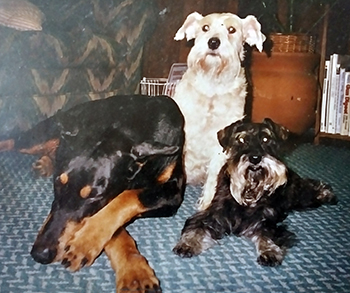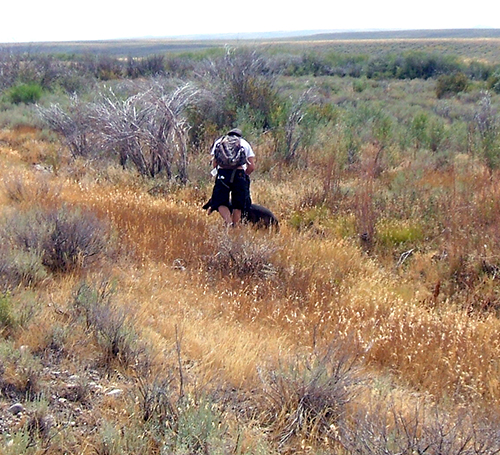Taking Care of Your Furry Friends in their Golden Years
Pets are our family, friends, and companions. Although we want to give them the finest, older dogs have unique needs and need a little extra care and attention to keep comfortable and healthy. Today, we'll talk about how to provide your aging dog the best care possible. Aging dogs can be challenging, but over the years we have discovered numerous ways to make it simpler.
Living with an elderly dog may be both challenging and enjoyable. Having an older dog presents special care concerns in addition to the physical affects of aging, such as failing vision, hearing loss, and arthritis.
Since an older dog doesn’t require the same amount of attention as a puppy or young adult dog does, it’s important to have other ways to care for them besides feeding and walking them. Fortunately, owning an aging dog is not impossible; it's just more difficult than it is with younger dogs. Here are five methods to provide your senior pet the loving care they need to live out their days in peace.
Feed a high-quality diet
You may be feeding your elderly pet a low-quality diet, but that doesn’t mean you should. A special elderly dog diet should be fed twice a day, with the quantity slowly decreased if your dog needs to lose weight.
Diabetes, kidney disease, and arthritis are all common complaints in older pets, and they’ll all require a special diet to help deal with their condition. A good high-quality diet for an elderly dog will contain ingredients to help manage their condition and keep them as comfortable as possible. It will also be low in fat and high in protein, to help maintain muscle mass. Using a good no-soy based dog food like lamb & rice or chicken & rice will help your dog with good nutrition while enabling them to eat less in a meal. This will make it easier on him and on you.
We recommend Farmer's Dog for a healthy fresh diet for your dog. See Reviews Page
Exercise regularly
It’s tempting to keep your elderly dog inside because of their declining health, but that’s not a healthy option. If they don’t get regular exercise, they could develop osteoarthritis, hyperthyroidism and other conditions. If your elderly dog is still able to get outside, make sure they get regular exercise.
A brisk walk will help keep their joints moving, and it will also help keep their minds active. If your aging pet isn’t able to walk long on their own, get them a doggie wheelchair or take them swimming. Regular exercise will improve the quality of their life, and it will help you avoid a pet that is in pain.
One way to increase activity and decrease inflammation is with a grounding mat. Hal Steiner highly recommends grounding mats after seeing remarkable improvements in himself and his personal body guard, 11.5 year old male Doberman, Omen, just by the introduction of a pet grounding mat in their sleeping place. Many owners will even get a bed size mat for themselves after they see the results in their dog.
Don’t forget about the mental health of your pet
Having a pet that is elderly can be rewarding, but it can also be challenging. They may seem happy and content, but they could also experience mild depression. A dog who has been housebroken all it's life may become as frustrated as you when he has accidents in the house. Even if you understand and don't complain about the accident, your dog knows he's made a mistake and exactly how you have always felt about that.
If you ignore these signs, your dog may end up in a dangerous situation. Make sure you follow your dog’s signs and get help if they need it. Aging can bring a wide range of emotions, and it’s important to keep an eye on your dog’s mental health as they get older. It could be an indication that they need some extra care. Make sure to keep your dog stimulated and happy, and always be ready to help them when they need it. If you can do this, your elderly dog will have a better chance of dealing with the changes that come with growing old.
Be prepared for unexpected expenses
While you can’t control the rising cost of everything, there are a few minor expenses you may run into when caring for an elderly dog. Grooming and dental care are an ongoing expense. Their teeth may also become loose or infected as they age, which could cause discomfort. These can be relatively minor expenses, but it’s a good idea to have some extra cash on hand to help cover them.
Cancers, hip problems and minor surgeries always crop up, there are many pet insurance plans to cover incidental medical expenses and even pet life insurance for replacement in case of loss or death.
Get professional help when needed
Most elderly dogs aren’t in need of any medical intervention. However, it’s important to remember that there’s a difference between your dog being old and your dog needing help to stay healthy. Make sure to let your veterinarian know if your dog has any other health concerns sometimes it's only something small that is the key. It’s also a good idea to let them know about any other dietary restrictions your pet may have. Your elderly dog may not need all the medical care that a younger dog does, but it’s important to know what your options are if that situation arises. Your elderly pet may not need to see a specialist, but it’s important to know what to do if you think they do.
Wrapping up
Living with an elderly dog can be rewarding, but it can also be frustrating and challenging. They may seem happy and content, but i important to remember that they may also need an eye on their mental health and some extra care. Thankfully, it's pretty simple to care for an elderly dog. Make sure to keep an eye on their diet, exercise regularly, and get professional help when needed.







